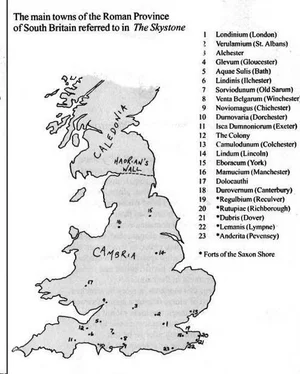Reassured, and suddenly relieved of a great mental weight, I realized just how great my debt was to Antonius Cicero. Caius agreed with me.
"What was the name he gave you after he abducted you to save your worthless skin?" The expression on his face was inscrutable. I had to think for a few seconds before the name came back to me.
"Gratens. Publius Gratens. Why do you ask?"
"Oh, it just occurred to me that Tonius might want to take some time off — a furlough — to attend the nuptials of his old friend Publius Gratens, since he knows the bride, and he and I have been friends for a long time. " Luceiia leaped to her feet and kissed him. "Caius, my beloved brother, I know you are a great soldier but there are times when you show streaks of absolute brilliance. I would love to see Tonius again, wouldn't you, Publius?"
I was as enthusiastic as she was. "Aye, I would. " I grinned. "I still owe him a bad headache. It would be appropriate to cause it with bridal wine.
" I had another idea. "Particularly if he had the abominably poor taste to bring Plautus with him as part of his escort. "
But Caius was quick to throw water on that notion.
"No! If he comes, he has to come alone. No escort. No one here will be calling you Publius Gratens, remember, and Publius Varrus is dead. No one who is not a good friend can even be allowed to suspect otherwise. Too dangerous. And Tonius will know that. I shall write to him tonight and send a man into Aquae Sulis to the garrison commander tomorrow, with a request to have it forwarded immediately. "
Of course he was correct, as usual, but I felt a keen sense of disappointment that Plautus would not be able to celebrate my reconstituted virility and my good taste in choosing a wife. Tonius's response took exactly ten days to arrive, causing Caius to wonder what the reason was for the obviously intensified stream of communications between garrisons. Messages sent through normal military channels would go from Aquae Sulis to Londinium and thence to the outlying garrisons. The speed of this return had to mean that priority messages were being sent directly between military district headquarters. Even before he opened the letter, he had decided to go himself to visit the garrison at Aquae Sulis, to find out personally what was in the wind. The letter from Tonius was longer and less formal than the previous one and anticipated, at least in part, our concerns. He would be delighted to visit us in May, partly to renew his delightful acquaintance with the bride-to-be, partly to see his two old friends, Caius Britannicus and Publius Gratens, but chiefly to share in the joining of two such fine and noble families, the progeny of which union could only be a benefit to the Empire. He was long overdue for an extended furlough, he pointed out, since, being himself without family, he seldom had reason or desire to absent himself from his posting and his charges. This, however, would be a joyous celebration, and he would be happy to request a whole month of leave to be able to participate in it properly.
He had taken the liberty to inform Caius's good friend Bishop Alaric of Verulamium of the wedding, since Alaric had been in Colchester when Caius's letter arrived, and Alaric had immediately decided to attend the wedding on his own invitation. The two hoped to be able to travel west together, but this would be entirely dependent on Tonius's ability to find a suitable replacement for his primus pilus, one Pontius Aulus Plautus, who had been appointed, to the pride and despair of Tonius himself, primus pilus to the Household Troop officers' training school in Londinium. A great honour for Plautus but a great inconvenience for Antonius Cicero. Plautus had already left Colchester to use up his accumulated furlough time of three months before taking up his new posting, and in the meantime, no one had been seconded to Colchester to replace him in what was a crucial and highly responsible position.
In closing, Cicero mentioned that the new Procurator had arrived and was installed in poor Varrus's erstwhile home. Tonius had met him officially, but had had no particular dealings with him prior to the time of writing. Tonius looked forward to seeing all of us again, and hoped that we would be able to find some time to talk together at length amid the press of the many dear friends who were bound to be descending on the Villa Britannicus for the nuptials.
Less than two weeks later, on the Ides of March, while I was working in my smithy and having no success with my design for a smelting furnace, a long and bedraggled procession of wagons arrived at our door. They'd travelled through the foulest spell of weather in what had already been a particularly nasty winter. There were three large draft wagons and three slightly smaller ones, each pulled by a pair of horses, and the sight of their occupants delighted me and touched me.
Equus was driving the lead wagon, and he had brought his whole family with him. Plautus held the reins of the second wagon, and at first I did not recognize him, out of uniform, muffled in a cloak and heavily bearded as he was. The third wagon was driven by the son of my own major-domo from Colchester, and his father and mother were in one of the other wagons. I was amazed and flattered and quite touched at this display of loyalty, even though they were, all of them, very quick to point out that they had come only for the wedding festivities and would be moving on afterwards. To where? None of them could say.
It took only moments, when we finally got around to talking about their future plans, to convince them that all of them had a place and a future here on the Villa Britannicus, since Luceiia and I would be setting up a household of our own after we were married and would have need of servants. Also, I was sadly in need of Equus's professional help in designing a smelting furnace for my skystones. They were not difficult to convince, and I knew that all of them had been hoping that we would be able to invite them to. stay. When they were assured of this, the reunion became a celebration.
That night, after dinner, the others left Equus, Plautus and me alone to reminisce together. Equus was obviously bursting to tell me about his decision to close up shop and bring everything out to the west. For a time after my departure from Colchester, he had hoped that all the furore would die down and that I would return to run the smithy with him, but the report by Cicero of my "death" a month or so later had ended that hope, and then the announcement of Seneca's appointment as Procurator had put finis to everything.
Equus had then begun amassing all of the equipment and material that he suspected I could want or require, including my grandfather's collection of treasures, which he had dismantled and packed. He had disposed of the smithy by trading it to a wagon-maker for the three big wagons, and he then bought the three smaller wagons and all the livestock with some of the gold I had given him. He had used Tonius Cicero and Plautus as intermediaries in this instance, not wishing to advertise the fact that he possessed gold. By the time he had loaded all of our belongings, including the amphora containing my grandfather's gold, onto the wagons, he had also recruited his other companions on the journey. Plautus had left town separately and joined them on the road. I could only embrace Equus and thank him warmly for his foresight and his loyalty. He gripped my arm tightly in silence, tears gleaming in his eyes.
I blinked my own tears away and turned to Plautus.
"And you, my friend. Tonius Cicero informs us you are to be congratulated. "
"On what? My posting?" He grunted. "Cicero pulled some strings. I'm to be the new primus pilus at the military officers' training school there. An honorary position. "
Читать дальше









